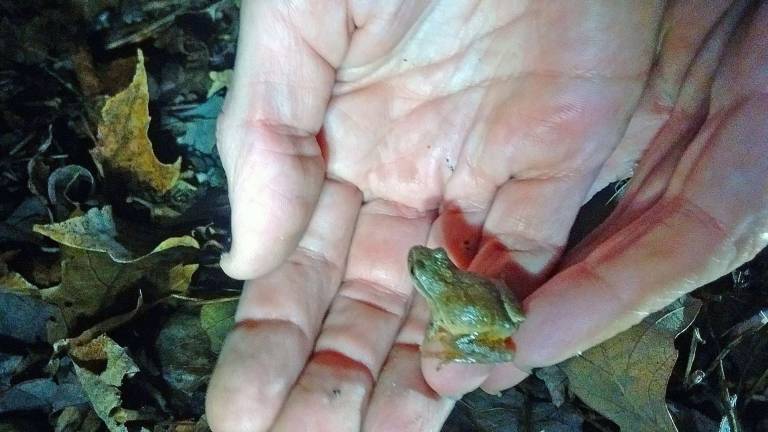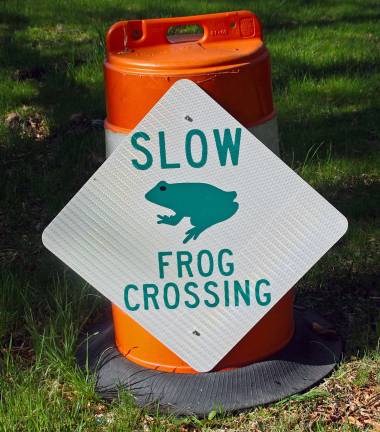Vernon Greenway Action Advisory Committee supports amphibian project


VERNON — The Vernon Greenway Action Advisory Committee has announced its support for the Vernon Amphibian Crossing Project, a local volunteer effort that aids in the rescue of Vernon’s native amphibian population. Every year, on the first warm, rainy night of spring, amphibians leave their burrows and begin the dangerous journey to nearby vernal pools to breed. Unfortunately, this often leads them across roadways; where up to 75 percent can be crushed by unsuspecting motorists.
Cathy McCartney, Vernon resident and amateur naturalist, started this volunteer project three years ago, after noticing amphibians on the road during the evening in early spring. She reached out to New Jersey Conserve Wildlife Foundation, whose biologists coached her over the phone and provided information needed to train volunteers here. According to the NJCWF website, “With high mortality rates year after year, it doesn’t take long for a population to nosedive.”
“Amphibians are in drastic decline worldwide, due to habitat loss, climate change, pesticides, and disease. Some of our local amphibians, like the salamanders, can live up to 20 years. To think that they can be crushed in the blink of an eye by an unsuspecting motorist is heartbreaking,” says McCartney. “This is why we’re doing this, and we are thrilled that Mayor Shortway and the Vernon Greenway Committee are loaning us their support.”
Michael Cheski, amphibian volunteer, longtime environmentalist, and member of The Vernon Greenway Action Advisory Committee, recently brought the project to the committee’s attention.
“I received 100 percent support. Most were not aware of this annual activity”, Cheski said. “and want to be more involved. Mayor Shortway and Dave Pullis of Vernon’s DPW acted immediately and provided us with official road signs that read "Frog Crossing", traffic cones, barrels and safety vests.” Volunteers also carry flashlights and often wear headlamps for safety.
The crossing volunteers are grateful for the township's support, since the roads in Vernon are treacherous, especially at night in the rain. Says volunteers Jo-ann Floridia, of Vernon,
“After we put the reflective signs out, we noticed immediately that the traffic slowed down," Jo-ann Floridia of Vernon said. “Now, many people even stop to ask us questions. Others have told us that they’ve seen the frogs in the road, and are glad we’re there. We’ve gotten a lot of positive response from local residents. Most people don’t know about this. I enjoy educating people as well as helping to protect wildlife.”
McCartney agrees that most people are not aware of the annual crossing, which takes about four nights of rain.
“On rainy nights, you can barely see them crossing the road," she said. "The peepers are an inch or smaller, and the salamanders look like little sticks. But once you're aware of them, you will recognize them."
Crossing nights are hard to predict, and the conditions must be rain, dusk or later, and temperatures of 40 degrees or higher. Volunteers notice they stop moving at about 41 degrees. Wind chill also plays a role. Weather reports are often inaccurate, and Vernon has several microclimates that are not even on the forecasters’ charts.
“Some years, we have a hard time keeping up with them," McCartney said. "Other nights we go out, and we see nothing. This year, we had sporadic drizzle at dusk. I think much of the crossing happened in the wee hours of the morning, when there was more rainfall. This is ideal, because there are few cars at those times.”
In recent years, volunteers have crossed hundreds of animals. Vernon, rich in biodiversity, is home to the wood frog, spotted salamander, Jefferson salamander, spring peeper, and American toad, to name a few of the amphibians the volunteers help cross. While volunteers often end up cold, tired, and drenched, those who do it are thrilled to be a part of this annual event. Says volunteer Susan Kehoe;
“I love helping them safely across the road," volunteer Susan Kehoe said. "It’s such a good feeling to be able to help our wildlife.”
The project is also supported by the New Jersey Animal Protection League, a statewide advocacy group that protects both domestic and wild animals. APL members have also assisted in promoting the project as well as coming out to help cross amphibians.
Amphibians lay a hundred to thousands of eggs depending on the species. Vernal pools are temporary and form in the spring from snowmelt and rainwater in highland and lowland areas. They do not contain permanent vegetation or predators to the breeding amphibians.